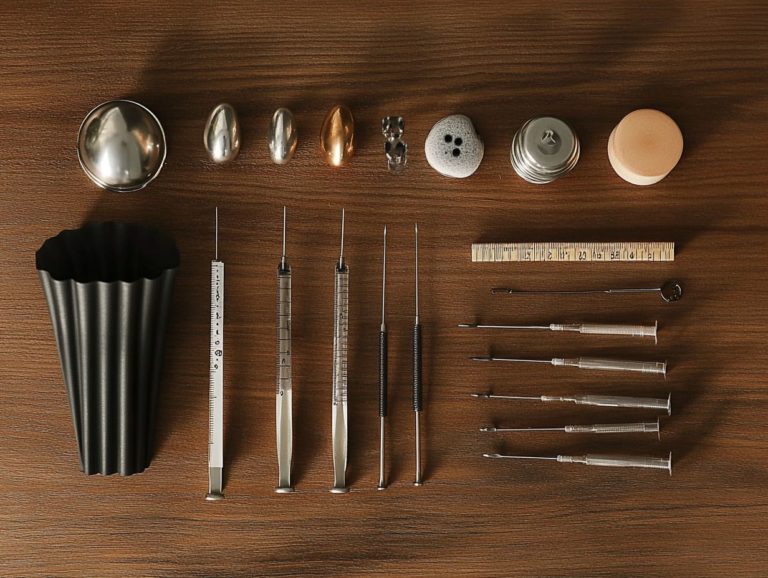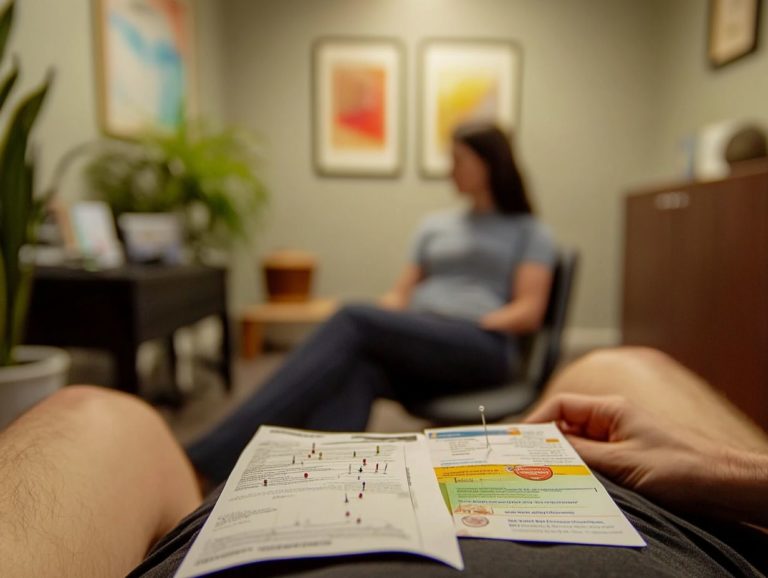The Role of Acupuncture in Post-Surgery Recovery
Acupuncture is a time-honored practice rooted in traditional Chinese medicine. It offers more than just pain relief; it can be a vital ally in your post-surgery recovery.
This article delves into the fundamentals of acupuncture, illuminating how it works and its myriad benefits, especially in managing pain and reducing inflammation after surgery. You ll discover which types of surgeries stand to gain the most from this holistic approach, along with guidance on finding the right practitioner for your needs.
We will discuss precautions to ensure your recovery process is both safe and effective.
Whether you are contemplating acupuncture for yourself or simply looking to understand its potential, this guide equips you with valuable insights for integrating this ancient practice into your modern healing journey.
Contents
- Key Takeaways:
- The Basics of Acupuncture
- Benefits of Acupuncture in Post-Surgery Recovery
- Pain Management
- Reducing Inflammation
- Types of Surgeries that May Benefit from Acupuncture
- Orthopedic Surgeries
- Abdominal Surgeries
- How to Incorporate Acupuncture into Post-Surgery Recovery
- Precautions and Potential Risks
- Frequently Asked Questions
- What is the role of acupuncture in post-surgery recovery?
- How can acupuncture help with post-surgery pain management?
- Is acupuncture safe to use after surgery?
- Can acupuncture help with post-surgery inflammation?
- How many acupuncture sessions are needed for post-surgery recovery?
- Can acupuncture be used alongside other post-surgery treatments?
Key Takeaways:

Experience the power of acupuncture to conquer pain and boost your recovery! Orthopedic and abdominal surgeries are among the types that may benefit from acupuncture. Finding a qualified practitioner and scheduling sessions properly are important steps in incorporating acupuncture into post-surgery recovery.
The Basics of Acupuncture
Acupuncture involves the delicate insertion of needles into specific points on the body, aiming to enhance bodily functions, including pain relief and recovery.
It has garnered significant recognition among healthcare providers for its efficacy in addressing conditions like postoperative pain, particularly following surgical interventions such as knee replacements. Patients increasingly seek alternatives to opioid-based pain management.
Acupuncture therapy stimulates the release of endorphins, enhances circulation, and fosters overall healing, making it a sought-after option for orthopedic patients.
What is Acupuncture?
Acupuncture is a time-honored medical practice that has been harnessed for thousands of years. It focuses on your body s remarkable ability to heal itself by stimulating specific points, known as acupuncture points, through gentle needle insertion.
Deeply rooted in ancient Chinese medicine, acupuncture emphasizes the balance of vital energy, or “Qi,” that flows through your body. Practitioners often use techniques like moxibustion and cupping to enhance wellness and promote healing.
In a modern context, medical acupuncture blends these ancient principles with Western medical understanding, applying evidence-based methods to tackle issues like chronic pain, anxiety, and migraines. This evolution makes acupuncture an appealing alternative to opioids, minimizing the risk of addiction while providing a holistic approach to pain management.
By recognizing both its rich historical roots and contemporary relevance, acupuncture stands out as a compelling option in today s healthcare landscape.
How Does it Work?
Acupuncture works by stimulating your nervous system, prompting the release of various chemicals in your muscles, spinal cord, and brain. This process significantly contributes to pain relief and bolsters recovery efforts.
These interactions trigger the release of endorphins, your body’s natural painkillers, effectively reducing any discomfort you may feel. Acupuncture also enhances circulation; when needles are inserted, blood flow to specific areas increases, helping to diminish inflammation and accelerate healing.
For example, individuals with chronic pain or sports injuries often report remarkable improvements after acupuncture sessions, crediting their recovery to enhanced oxygen and nutrient delivery to damaged tissues.
These physiological changes not only address acute symptoms but also promote long-term wellness by restoring balance within your body’s systems.
Benefits of Acupuncture in Post-Surgery Recovery
Acupuncture presents a wealth of benefits for those recovering from surgery, especially in managing postoperative pain and promoting a smoother recovery journey.
As a complementary treatment, it significantly reduces inflammation, accelerates healing, and enhances the overall patient experience following surgical procedures like knee replacement.
By decreasing the need for opioids, acupuncture serves as a vital tool in pain management and rehabilitation for orthopedic patients, positioning itself as an essential component of effective post-operative care strategies.
Consider scheduling an acupuncture session to explore its potential in enhancing your recovery.
Pain Management

Acupuncture is a highly regarded method for effective pain management. It offers a safe and natural option to opioid use, especially if you’re facing postoperative pain or chronic discomfort.
This ancient treatment uses thin needles to relieve pain by stimulating specific energy pathways in your body. Many people have found relief and an overall enhancement in their quality of life after incorporating acupuncture into their recovery or chronic pain treatment plans.
Remarkable case studies feature individuals who, after years of discomfort from conditions like arthritis and fibromyalgia, discovered profound relief through regular acupuncture sessions. These experiences highlight the potential to lessen reliance on pain medications while nurturing mental and emotional well-being throughout the healing journey.
Reducing Inflammation
One key benefit of acupuncture is its ability to reduce inflammation, especially important during post-operative recovery. Inflammation can impede healing and prolong discomfort.
This practice enhances circulation and promotes a balanced immune response. When acupuncture points are activated, blood flow increases to the affected area, delivering vital nutrients and oxygen while aiding in the removal of metabolic waste.
For instance, patients recovering from orthopedic surgeries like total knee replacements often notice substantial improvements in their recovery timelines due to reduced swelling and pain. The interaction between acupuncture and your immune system fosters a harmonious inflammatory response, ultimately leading to faster healing.
Types of Surgeries that May Benefit from Acupuncture
Various types of surgeries can significantly benefit from acupuncture as a complementary therapy. This is particularly true for orthopedic procedures like knee replacements and abdominal surgeries, where effective pain relief and improved recovery are essential for optimal patient outcomes.
Orthopedic Surgeries
Orthopedic surgeries, especially knee replacements, are excellent candidates for acupuncture therapy. This treatment can provide significant pain relief and support your healing process during recovery.
Numerous studies illustrate how acupuncture can alleviate post-surgical pain, improve mobility, and enhance overall recovery outcomes. For example, research published in the Journal of Orthopedic Surgery found that patients who received acupuncture after surgery experienced a 30% reduction in pain levels compared to those who did not.
Testimonials from orthopedic patients emphasize acupuncture’s role in reducing dependence on pain medications, minimizing potential side effects. By aiding circulation and reducing inflammation, acupuncture is a valuable tool in your rehabilitation plan for knee replacement, helping you transition back to an active lifestyle.
Abdominal Surgeries
Patients recovering from abdominal surgeries may find significant benefits from acupuncture. It alleviates postoperative pain and promotes a faster recovery thanks to its pain-relieving properties.
This holistic practice taps into your body’s natural healing mechanisms, which can be especially advantageous for those dealing with conditions like endometriosis or recovering from hernia repair.
By targeting areas of tension, acupuncture not only alleviates pain but also enhances circulation, ensuring essential nutrients reach the surgical site. This can lead to fewer complications, reduced reliance on pain medication, and an overall smoother healing experience.
The calming effects of acupuncture can also ease the anxiety that often accompanies recovery, making your journey back to health feel more manageable and less intimidating.
How to Incorporate Acupuncture into Post-Surgery Recovery

Incorporating acupuncture into your post-surgery recovery requires careful planning.
Start by finding a qualified practitioner who specializes in recovery after surgery.
Finding a Qualified Practitioner
It’s essential to choose a qualified acupuncturist for effective treatment.
Look for practitioners certified by organizations like the National Certification Commission for Acupuncture and Oriental Medicine.
These certifications ensure they have completed extensive training.
Check their educational background; a master s degree or higher is ideal.
Verify their credentials online or ask for documentation directly.
A preliminary consultation can provide valuable insights into their experience and care approach.
Frequency and Timing of Sessions
The frequency and timing of your acupuncture sessions can greatly impact your recovery.
Many find that regular sessions during initial healing greatly enhance pain relief.
Experts usually recommend one to two sessions per week in the first month after surgery.
Your surgical procedure’s complexity and your overall health can influence this frequency.
If you had invasive surgery, more frequent sessions might be helpful.
Communicate openly with your practitioner to tailor your treatment.
Precautions and Potential Risks
While acupuncture is often safe, be mindful of potential risks during recovery.
When to Avoid Acupuncture
Some conditions may require you to skip acupuncture, especially severe bleeding or active infections.
If you have a compromised immune system, exercise caution with acupuncture.
Consult your healthcare provider before starting treatment to discuss your medical history.
This dialogue ensures a safe and effective approach to acupuncture tailored to your health needs.
Start searching for qualified acupuncturists now to support your post-surgery recovery!
Possible Side Effects

While acupuncture is generally safe, you should be aware that it can come with potential side effects, such as temporary soreness and bruising. Mild fatigue can also occur, especially when used for post-operative recovery.
These effects can vary from person to person, often depending on your individual sensitivity and the specific techniques used by your practitioner.
You might also experience slight dizziness or an overall sense of relaxation. This can be both a side effect and a beneficial outcome of acupuncture.
These reactions are usually short-lived and can be managed by staying hydrated, applying ice to any tender areas, and giving your body some time to adjust after the treatment.
Understanding these possible responses can reassure you, enabling you to engage more fully in your recovery process while maximizing the benefits that acupuncture can offer.
Frequently Asked Questions
What is the role of acupuncture in post-surgery recovery?
Acupuncture is a form of traditional Chinese medicine that involves inserting thin needles into specific points on the body to help your body heal. In post-surgery recovery, acupuncture can help reduce pain and inflammation while promoting overall healing.
How can acupuncture help with post-surgery pain management?
Acupuncture has been shown to stimulate the release of endorphins, which are natural pain-relieving chemicals in the body. This can help reduce pain and discomfort after surgery without the need for medication.
Is acupuncture safe to use after surgery?
Yes, acupuncture is generally considered safe when performed by a licensed and trained practitioner. It is a non-invasive treatment that carries minimal risks and side effects.
Can acupuncture help with post-surgery inflammation?
Yes, acupuncture can help reduce inflammation and swelling after surgery. The needles stimulate circulation and promote the body’s natural anti-inflammatory response, helping to speed up the healing process.
How many acupuncture sessions are needed for post-surgery recovery?
The number of acupuncture sessions needed for post-surgery recovery can vary depending on the individual and the type of surgery. Generally, a series of 6-12 sessions is recommended for optimal results. Your acupuncturist will create a personalized treatment plan based on your specific needs.
Can acupuncture be used alongside other post-surgery treatments?
Yes, acupuncture can be used as a complementary treatment alongside other post-surgery treatments, such as physical therapy or pain medication. It can help enhance the effects of these treatments and promote a faster recovery.
For personalized guidance, consider consulting with a licensed acupuncturist to explore how acupuncture can specifically benefit your recovery.






